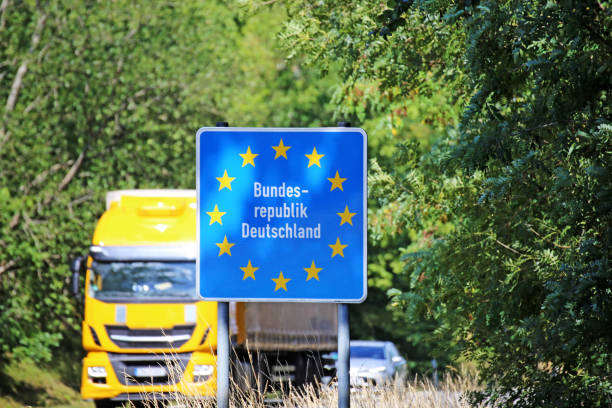
06
Aug 2025
The clock is ticking for UK-based hauliers, coach operators, and event logistics firms. Starting October 12, 2025, a new EU system will enforce strict border controls, and industry leaders warn that failure to act could cripple cross-border business.
New EU system threatens UK logistics
The European Union’s new Entry/Exit System (EES) will electronically track non-EU citizens entering and exiting the Schengen Area.
Unlike the old manual passport stamping method, EES will use biometric data — including facial recognition and fingerprints — to ensure strict compliance with the 90/180-day rule.
This rule limits stays to 90 days in any rolling 180-day period. For UK drivers, now classified as non-EU citizens post-Brexit, that means fewer trips, tighter schedules, and less work.
Why drivers sound the alarm
UK-based logistics and live event operators depend on flexible, short-term, frequent travel to Europe. The EES will make this near impossible. With every crossing logged, drivers face automatic penalties for overstays, even if accidental.
“This will have a profound impact on UK-based coach, haulage, and live events logistics businesses,” said Richard Smith, Managing Director of the Road Haulage Association (RHA).
RHA’s recent industry survey paints a grim picture. Over half of affected operators expect to reduce EU trips. Many plan to shrink their workforce to stay compliant with the new limits.
Business at risk without exemption
The UK’s live events and road transport sectors risk losing international contracts. British crews are often preferred for their skill and experience, especially for large-scale concerts and tours. However, new rules will make hiring UK teams more complex and costly.
“UK events operators are world-leading in their field,” the RHA stated. “But that’s now under threat — and so is other international work.”
Without a visa exemption, operators said that the new rules could paralyze business. Companies working across multiple EU countries will struggle to manage trips within the new time limits. Event staff, truck drivers, and technicians risk being grounded mid-tour.

(Image courtesy of U.J. Alexander via iStock)
What the RHA wants
The RHA is calling on the UK government to act fast. It wants a professional driver’s exemption — a visa-free arrangement that allows frequent, short-term cross-border movement for essential workers.
“This is about protecting jobs and businesses,” said Smith. “We’re working with operators and trade bodies, and lobbying MPs and government departments to raise awareness with ministers.”
The association urges all affected businesses to contact their local Members of Parliament. They’ve launched a campaign to collect support before the EES goes live.
The goal: push for a policy shift that recognizes the unique role of professional drivers in international commerce.
UK border rules no better
Ironically, the UK has already rolled out its own border control scheme. Since April 2025, travelers from the EU must apply for an Electronic Travel Authorisation (ETA) before entering Britain.
It costs £16 and covers stays up to six months, but it doesn’t track time spent, making it more lenient in some ways, but still unfriendly to frequent travelers.
Yet neither the UK nor EU currently offer exemptions for drivers. The industry said that this imbalance creates unfair barriers and could strain international cooperation.
Double trouble for drivers
Once the EES activates, the imbalance becomes clearer. UK drivers will face real-time biometric enforcement months before similar checks apply to EU nationals entering the UK. That asymmetry fuels concerns over fairness.
With no flexibility, drivers working on seasonal or irregular timetables — like music tours or fashion shows — may be forced to cancel jobs or change staffing mid-tour.
Rethinking time limits at the border
Short-term visitors—especially frequent UK-based drivers—face stricter checks under the EES, which enforces the 90/180 rule via biometric tracking. This impacts logistics and live-event crews whose work depends on repeated short stays.
With the European Travel Information and Authorization System (ETIAS) launching six months after the EES launch, administrative burdens and digital surveillance will intensify.
Migrants with legal residence aren’t affected, but the growing rigidity may complicate mobility for temporary workers and seasonal contractors.
A test case for border flexibility
The EES rollout pressures EU countries to clarify where exemptions fit within Schengen policy. The growing call for a professional driver’s exemption may spark broader debates about balancing security, efficiency, and labor market needs.
Immigration policies could shift toward sector-based flexibilities—or harden, if exemptions are denied—potentially influencing how future visa policies like ETIAS are applied or modified.
A threat to cross-border work
As the EES prepares to go live, its automated enforcement of the 90/180 rule will drastically limit how often UK-based drivers can legally work across EU borders.
For professional drivers in logistics, live events, and coach travel, this poses a real and immediate threat to jobs, businesses, and the very industries that thrive on flexible, frequent EU access.
That’s why the call for a professional driver’s exemption to the EES isn’t just a bureaucratic ask; it’s a necessary step to keep vital sectors moving.